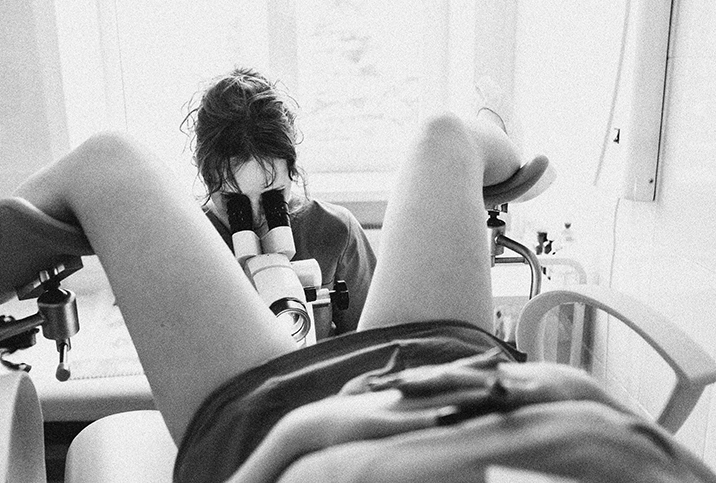Can You Get Cervical Cancer if You Don't Have Sex?

As the name suggests, cervical cancer develops in the cervix, a muscular, donut-shaped connector between your vagina and uterus. In the United States, about 13,000 new cases of this disease are reported each year. The annual death toll is about 4,000.
Unlike other gynecological cancers, cervical cancer is almost entirely preventable thanks to regular Pap smears that screen for abnormal cells before they become cancerous.
Almost all instances of cervical cancer are caused by a lingering case of human papillomavirus (HPV), a common sexually transmitted infection (STI), but the HPV vaccine has greatly reduced the number of cases around the world.
The big question is: Can you get cervical cancer if you don't have sex?
The answer: Yes, in rare circumstances.
Causes of cervical cancer
"Between 92 percent and 96 percent of all cervix cancers are caused by the HPV virus," explained Clare Bertucio, M.D., a radiation oncologist and the CEO of Medicine Mama's Apothecary, an organic skincare company in Port Angeles, Washington.
That leaves a small percentage of cases not associated with HPV. These rare, HPV-negative cervical cancer cases may not be associated with sexual activity at all, according to Ritu Salani, M.D., a gynecologic oncologist and professor at David Geffen School of Medicine at UCLA in Los Angeles.
Unfortunately, the non-HPV causes of cervical cancer are still unknown. Though smoking and HIV infection are known to increase the risk of this disease, research doesn't suggest they cause it.
"There are some types of cervical cancer that are associated with genetic risk," Salani said.
Unfortunately, the non-HPV causes of cervical cancer are still unknown.
Mutations in specific genes might cause cervical cancer in people who aren't sexually active, according to a 2020 research review published in the journal Frontiers in Oncology.
The review also suggested that what looks like non-HPV cervical cancer is sometimes a misclassification. Perhaps the so-called cervical cancer is actually endometrial cancer that has spread to the cervix. In other instances, an HPV test produces a false negative.
"As tests become more advanced, we are noticing less and less non-HPV related cases," Bertucio noted.
True HPV-negative cervical cancers are almost all cervical adenocarcinomas with unclear causes, the review stated.
The bottom line: While an overwhelming majority of cervical cancer cases stem from STIs, it might still be possible to get the disease even if you're not sexually active, though the likelihood is low.
More than 9 in 10 cervical cancer cases are linked to HPV. At least 4 in 5 women get infected with HPV before age 50, but only about 10 percent develop a long-lasting infection that may lead to cancer, according to the Centers for Disease Control and Prevention (CDC).
Early detection is still key
If you have a cervix but aren't sexually active, you might be tempted to put off cervical cancer screenings. Don't.
"The only person who would be at zero risk for HPV-related cervical cancer would be someone who has not ever been sexually active," Bertucio said.
And since the cause of non-HPV-related cervical cancer is unclear, there's no way to know if you're at risk.
Medical professionals rely on Pap screening tests to check for cervical cancer. This involves using a long, Q-tip-like object to scrape sample cells from the cervix. Pap smears are recommended every three years for women between 21 and 65 years old. HPV testing is recommended every five years for women ages 25 to 65. Remember: You should still get an annual pelvic exam, which is different from a Pap smear, though your Pap can be done at the same time.
"Pap smears are an easy, cost-effective screening for a potentially life-threatening disease," Bertucio emphasized. "Any woman who is or has been sexually active could be at risk and should consider screening."
"Patients with an immunocompromised status [HIV or transplant recipients] are at higher risk and should be screened more frequently," Salani added.
Cervical cancer prevention
More than 90 percent of cervical cancers can be prevented by getting regular Pap smear screenings and the HPV vaccine. It really is that simple.
The HPV vaccine is recommended for children—both boys and girls—starting as early as age 9, but is approved for people up to age 45 in the United States, so talk to your doctor if you did not receive it as a child.
You can also lower your risk of cervical cancer—HPV-related or not—by engaging in safer sexual practices and avoiding tobacco use, Salani said.
"Safer sex" includes a variety of practices meant to protect you and your partner from sexually transmitted diseases (STDs) and STIs, including HPV. Here are some safer sex rules to follow:
- Use barrier methods, such as condoms and dental dams, whenever you have vaginal, anal or oral sex
- Get regularly tested for STIs/STDs
Don't be afraid to ask any and all sexual partners about their sexual history


















